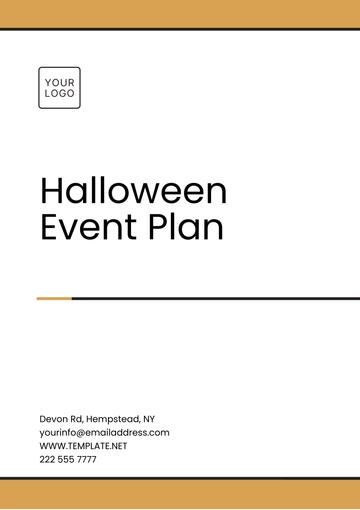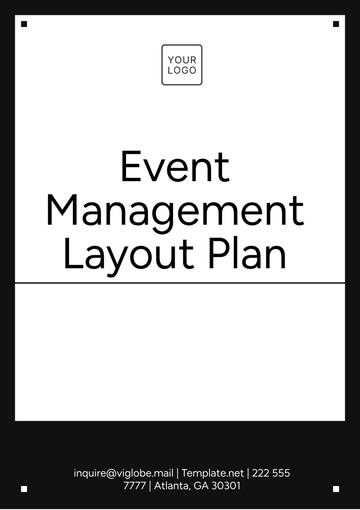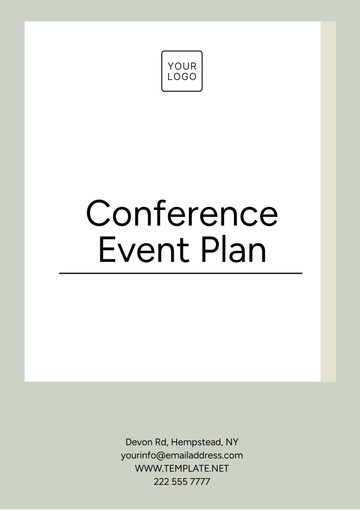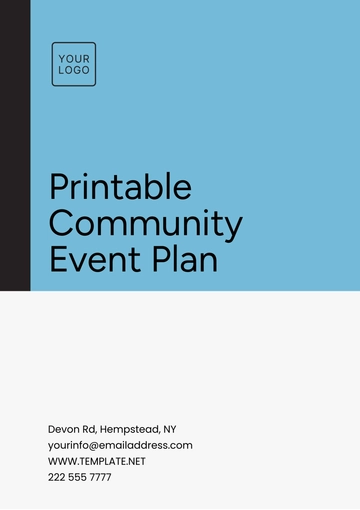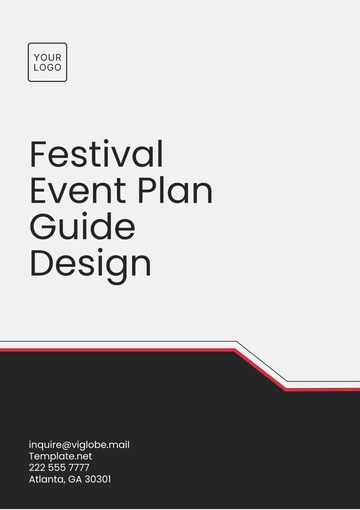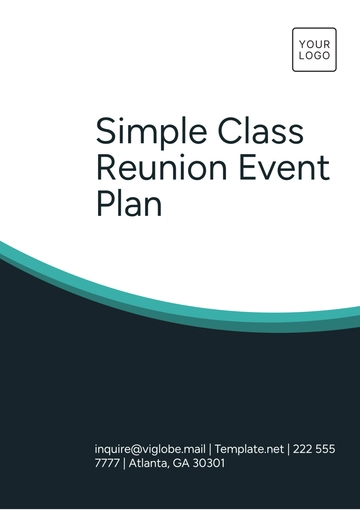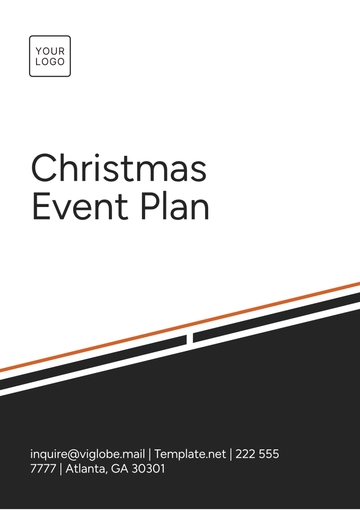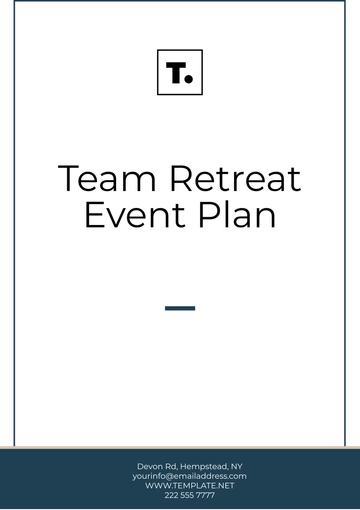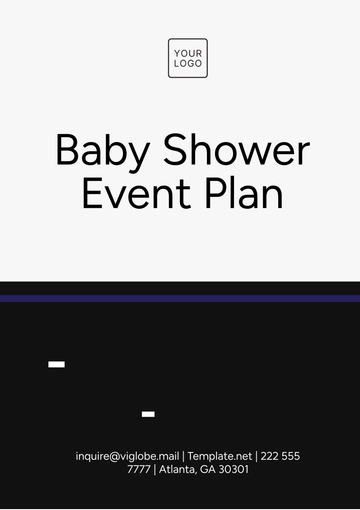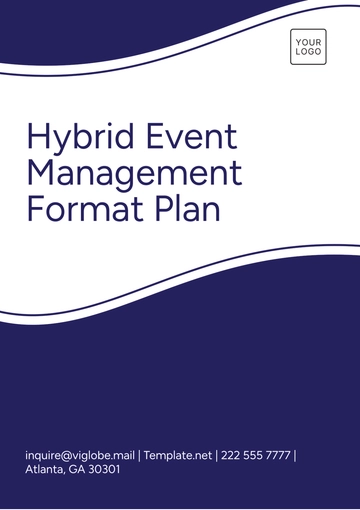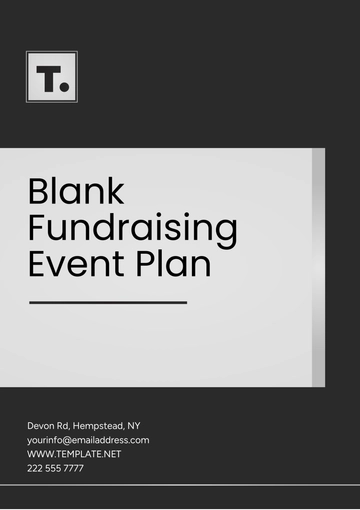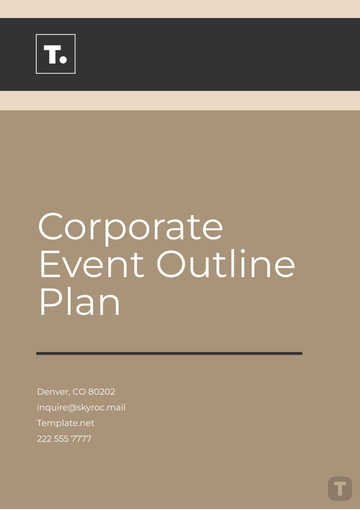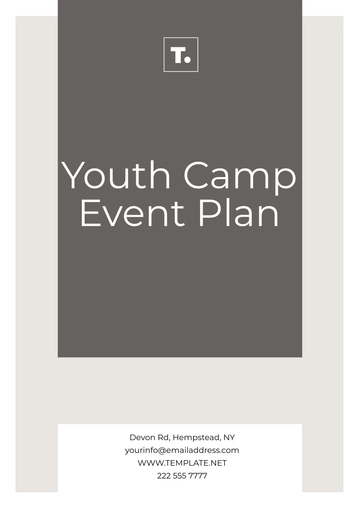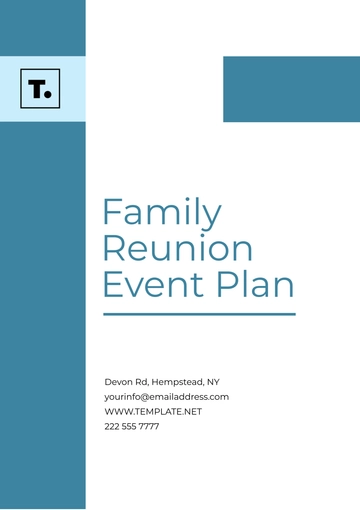Free Comprehensive Event Marketing Advertising Plan
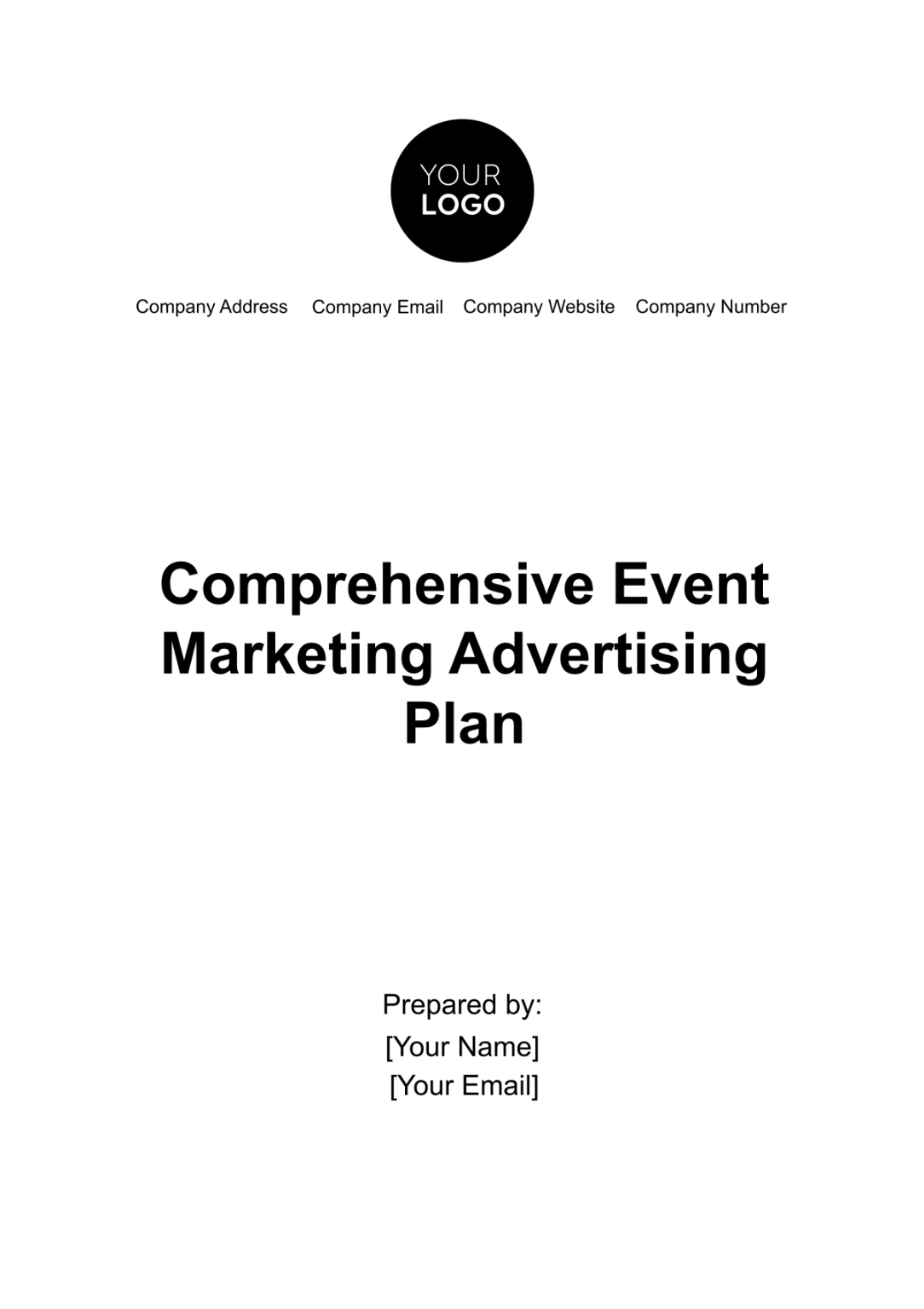
Advertising Plan
Introduction
This plan is the basis of our initiative to elevate the [Your Company Name]’s brand presence and forge deeper connections with our clientele. Through carefully curated and executed events, we aim to showcase our prowess in the advertising industry, setting new standards for innovation and engagement.
Objective
Our primary objective is to leverage these events to highlight our innovative advertising solutions and create memorable experiences for attendees. This approach is aimed at enhancing brand engagement and generating valuable leads, which are essential for our growth and market presence.
Core Strategy Elements
Our strategy revolves around two elements: brand engagement and lead generation. We see each event as a unique opportunity to display our creativity and expertise, making every moment an experience that resonates with our audience. Simultaneously, these events serve as fertile ground for nurturing new business relationships, turning potential leads into loyal clients.
In our pursuit of these objectives, we remain committed to principles of innovation, sustainability, and responsibility. Each event is a platform for demonstrating our commitment to ethical practices and social responsibility. This approach not only strengthens our brand but also sets a new benchmark for excellence in the industry.
Strategy
The strategy for this event is a blend of audience engagement, innovative branding, digital integration, partnerships, and measurable outcomes. This multifaceted approach is designed to create meaningful connections with our target audience, ultimately driving business growth and brand loyalty.
1. In-depth Audience Engagement:
Understanding our audience is the first step in our strategic plan. We delve deep into market research to identify our primary and secondary audience demographics. This understanding informs every aspect of our event planning, from themes to content, ensuring that our events resonate with the audience on a personal and professional level. Customized experiences tailored to audience preferences and industry trends are key to our strategy, fostering a connection that goes beyond the event itself.
2. Innovative Event Selection and Branding:
Our event participation is about making a statement. We focus on industry-relevant trade shows and conferences while also hosting exclusive seminars and webinars on emerging advertising trends. Each event is an opportunity to reinforce our brand identity and values. The branding at these events will be a showcase of our creativity and forward-thinking, making sure that the company stands out in a crowded marketplace.
3. Comprehensive Digital Integration:
Our event marketing extends beyond physical venues. We leverage social media platforms and other digital channels for pre-event hype, live event engagement, and post-event follow-up. This digital integration ensures a continuous engagement loop with our audience, enhancing the event experience and extending its impact. Interactive content, live updates, and digital discussions will be central to keeping our audience engaged and involved.
4. Strategic Partnerships and Sponsorships:
Collaboration is a key component of our strategy. By partnering with media partners and industry influencers, we expand our reach and tap into new audience segments. Sponsorships play a dual role – they help offset event costs and, more importantly, elevate our brand visibility. These partnerships and sponsorships are carefully chosen to align with our brand values and goals, ensuring a mutually beneficial relationship.
5. Metrics for Success:
To gauge the effectiveness of our event marketing, we rely on a set of clearly defined KPIs. Metrics like attendee numbers, lead generation, social media engagement, and post-event surveys will provide us with valuable insights. These data points will not only measure the immediate success of each event but also inform future strategies, allowing us to continuously refine and enhance our approach.
[Your Company Name] aims to create a series of impactful events that elevates our brand and create lasting relationships with our audience. Our approach is dynamic, adaptable, and focused on delivering measurable results, positioning us as a leader in innovative event marketing within the advertising industry.
Implementation Timeline
The implementation timeline for our strategy is designed to ensure a structured and efficient rollout of activities across the year. This timeline balances the need for thorough planning, effective execution, and post-event analysis to maximize the impact of each event.
Timeline for 2050:
Phase | 1st Quarter | 2nd Quarter |
Audience Research | Research & Identify | Refine & Segment |
Event Planning | Conceptualization | Finalization |
Digital Integration | Strategy Development | Content Creation |
Event Execution | - | Pilot Event |
Analysis and Reporting | Intermediate Assessment | Intermediate Assessment |
Phase | 3rd Quarter | 4th Quarter |
Audience Research | Analysis and Reporting | Ongoing Insights |
Event Planning | Logistics Setup | Evaluation |
Digital Integration | Execution | Analysis |
Event Execution | Major Events | Major Events |
Analysis and Reporting | Comprehensive Review | Year-End Summary |
1. 1st Quarter - Setting the Foundation:
The first quarter focuses on audience research to identify and segment our target demographics. Concurrently, we begin the conceptualization of event themes and formats. In terms of digital strategy, we lay the groundwork for our digital marketing efforts.
2. 2nd Quarter - Gaining Momentum:
During the second quarter, we finalize our event plans, create engaging content for digital platforms, and pilot our first event. This phase is crucial for testing our strategies and making necessary adjustments.
3. 3rd Quarter - Peak Execution:
The third quarter is the most action-packed, with the execution of major events. Our digital integration strategy is in full swing, enhancing the event experience and engagement. This is the period where our planning efforts materialize into tangible experiences for our audience.
4. 4th Quarter - Reflection and Growth:
The final quarter is dedicated to evaluating the success of our events and digital strategies. We conduct a comprehensive review of our KPIs and gather feedback. This period is essential for understanding our achievements and areas for improvement, setting the stage for planning the next year's strategies.
Through this carefully structured timeline, [Your Company Name] ensures that each phase of our event marketing strategy is given the attention and resources needed for success. This approach allows for flexibility and adaptability, ensuring that we stay ahead of industry trends and audience expectations.
Budget Allocation
The budget is planned to ensure optimal allocation of resources across various key areas. This allocation covers the essential costs and strategically invests in areas that will bring the highest return on investment.
Expense Category | Amount | Description |
Event Registration/Fees | 20,000 | Costs for trade shows and hosting events. |
Marketing and Promotion | 25,000 | Investment in digital and traditional marketing channels. |
Travel and Accommodation | 15,000 | Travel costs for team members, including accommodation and transportation. |
Production and Setup | 20,000 | Expenses related to event setup, including technology and staging. |
Miscellaneous Expenses | 10,000 | Contingency funds for unforeseen expenses during events. |
Partnership and Sponsorship | 10,000 | Costs associated with securing partnerships and sponsorships. |
TOTAL: | 100,000 | - |
1. Event Registration/Fees:
This is a significant portion of our budget, investing in these platforms, we can guarantee that the company is visible in gatherings that are most likely to draw our target demographic. This strategic presence in select events is a direct investment in brand exposure and networking opportunities, vital for our business growth and reputation in the advertising sector.
2. Marketing and Promotion:
A substantial portion of our budget is dedicated to marketing and promotion. This investment spans across digital marketing campaigns, which include social media advertising, email marketing, content creation, and SEO, as well as traditional methods like print media, billboards, and broadcast ads. This blend ensures a reach, targeting audiences both online and offline, and is critical for driving high attendance and engagement at our events.
3. Travel and Accommodation:
As our team will be attending various events, it's crucial to budget for their travel and stay. This expense ensures that our representatives can attend these events nationwide or globally, without the constraints of travel costs. It includes airfare, ground transportation, hotel stays, and daily allowances. This facilitates networking and personal engagement with potential clients.
4. Production and Setup:
This budget category is essential for creating immersive and memorable experiences at events. It encompasses the costs associated with designing, producing, and setting up our event booths, stages, and incorporating the latest technology. This investment is for making a lasting impression on attendees and differentiating our brand in a crowded market. A well-designed booth or event space attracts attendees and conveys our brand’s professionalism and attention to detail.
5. Miscellaneous Expenses:
This is a contingency fund to cover unexpected costs, this ensures that unforeseen costs, which are not uncommon in event scenarios, do not compromise the quality or success of our events. This may include last-minute equipment rentals, additional staffing needs, or emergency repairs and replacements, ensuring that we are well-prepared for any situation.
6. Partnership and Sponsorship:
We allocate funds for establishing partnerships and sponsorships. This budget covers collaborations with other brands, industry influencers, or media partners, enhancing our visibility and reputation in the industry. These partnerships are opportunities to align with entities that share our values and can help us reach broader audiences or offer unique experiences to our event attendees.
By planning and allocating our budget across these categories, we can be certain that every dollar spent contributes towards achieving our event marketing goals. This budget plan reflects our commitment to a strategic and results-driven approach in our event marketing endeavors.
Success Metrics
Our approach to measuring the success of our event marketing strategy involves a multi-dimensional set of metrics. These KPIs are indicators of our performance, audience engagement, and the overall impact of our events.
1. Attendee Numbers:
This primary metric indicates the popularity and reach of our events. We will track the total number of attendees, comparing it against our target audience size. This data will be gathered through event registrations, check-ins, and digital platform analytics.
2. Leads Generated:
A critical measure of success is the number of leads generated from each event. We will track this through registration forms, business cards collected, and interactions logged by our sales team. Each lead will be categorized based on potential value and follow-up strategy.
3. Engagement Levels:
Engagement during the events is key to understanding audience interest and interaction. We will measure this through social media activity, participation in interactive sessions, and feedback forms. Metrics like social media mentions, shares, and session attendance will provide valuable insights.
4. Conversion Rates:
Post-event, the focus shifts to how many leads convert into clients or sales. This metric will be tracked through our CRM system, analyzing the journey from lead generation to conversion.
5. Return on Investment (ROI):
We will calculate the ROI of each event by comparing the revenue generated (or potential revenue in terms of leads) against the total cost of the event. This financial metric is crucial for understanding the economic efficiency of our event marketing efforts.
6. Attendee Satisfaction:
Through surveys and feedback forms, we will gauge attendee satisfaction, which is vital for understanding the event’s impact and areas for improvement. High satisfaction levels often correlate with increased brand loyalty and word-of-mouth promotion.
7. Social Media Reach and Engagement:
We will monitor social media metrics, including reach, engagement rates, and follower growth, during and after events. These indicators help assess how effectively our events extend our digital footprint.
These metrics aim to assess the effectiveness of each event and gather insights for continuous improvement. This approach to success metrics ensures that every aspect of our event marketing is aligned with our overall business objectives, enabling us to refine our strategies for future endeavors.
Conclusion
This event marketing plan for [Your Company Name] is designed to maximize brand exposure and deepen client relationships. Our focus is on achieving tangible growth in both brand awareness and business development. We are setting measurable goals, tracking progress through analytics, and adapting our strategies in real-time to respond to market trends and feedback. By consistently delivering value and innovation at every touchpoint, we are building a foundation for long-term business success and client loyalty.
- 100% Customizable, free editor
- Access 1 Million+ Templates, photo’s & graphics
- Download or share as a template
- Click and replace photos, graphics, text, backgrounds
- Resize, crop, AI write & more
- Access advanced editor
Unlock the full potential of your event marketing strategies with the Comprehensive Event Marketing Advertising Plan Template from Template.net. This editable and customizable template, equipped with our intuitive Ai Editor Tool, streamlines the process of crafting impactful marketing plans. Elevate your events with precision and efficiency using Template.net's cutting-edge solutions.
You may also like
- Finance Plan
- Construction Plan
- Sales Plan
- Development Plan
- Career Plan
- Budget Plan
- HR Plan
- Education Plan
- Transition Plan
- Work Plan
- Training Plan
- Communication Plan
- Operation Plan
- Health And Safety Plan
- Strategy Plan
- Professional Development Plan
- Advertising Plan
- Risk Management Plan
- Restaurant Plan
- School Plan
- Nursing Home Patient Care Plan
- Nursing Care Plan
- Plan Event
- Startup Plan
- Social Media Plan
- Staffing Plan
- Annual Plan
- Content Plan
- Payment Plan
- Implementation Plan
- Hotel Plan
- Workout Plan
- Accounting Plan
- Campaign Plan
- Essay Plan
- 30 60 90 Day Plan
- Research Plan
- Recruitment Plan
- 90 Day Plan
- Quarterly Plan
- Emergency Plan
- 5 Year Plan
- Gym Plan
- Personal Plan
- IT and Software Plan
- Treatment Plan
- Real Estate Plan
- Law Firm Plan
- Healthcare Plan
- Improvement Plan
- Media Plan
- 5 Year Business Plan
- Learning Plan
- Marketing Campaign Plan
- Travel Agency Plan
- Cleaning Services Plan
- Interior Design Plan
- Performance Plan
- PR Plan
- Birth Plan
- Life Plan
- SEO Plan
- Disaster Recovery Plan
- Continuity Plan
- Launch Plan
- Legal Plan
- Behavior Plan
- Performance Improvement Plan
- Salon Plan
- Security Plan
- Security Management Plan
- Employee Development Plan
- Quality Plan
- Service Improvement Plan
- Growth Plan
- Incident Response Plan
- Basketball Plan
- Emergency Action Plan
- Product Launch Plan
- Spa Plan
- Employee Training Plan
- Data Analysis Plan
- Employee Action Plan
- Territory Plan
- Audit Plan
- Classroom Plan
- Activity Plan
- Parenting Plan
- Care Plan
- Project Execution Plan
- Exercise Plan
- Internship Plan
- Software Development Plan
- Continuous Improvement Plan
- Leave Plan
- 90 Day Sales Plan
- Advertising Agency Plan
- Employee Transition Plan
- Smart Action Plan
- Workplace Safety Plan
- Behavior Change Plan
- Contingency Plan
- Continuity of Operations Plan
- Health Plan
- Quality Control Plan
- Self Plan
- Sports Development Plan
- Change Management Plan
- Ecommerce Plan
- Personal Financial Plan
- Process Improvement Plan
- 30-60-90 Day Sales Plan
- Crisis Management Plan
- Engagement Plan
- Execution Plan
- Pandemic Plan
- Quality Assurance Plan
- Service Continuity Plan
- Agile Project Plan
- Fundraising Plan
- Job Transition Plan
- Asset Maintenance Plan
- Maintenance Plan
- Software Test Plan
- Staff Training and Development Plan
- 3 Year Plan
- Brand Activation Plan
- Release Plan
- Resource Plan
- Risk Mitigation Plan
- Teacher Plan
- 30 60 90 Day Plan for New Manager
- Food Safety Plan
- Food Truck Plan
- Hiring Plan
- Quality Management Plan
- Wellness Plan
- Behavior Intervention Plan
- Bonus Plan
- Investment Plan
- Maternity Leave Plan
- Pandemic Response Plan
- Succession Planning
- Coaching Plan
- Configuration Management Plan
- Remote Work Plan
- Self Care Plan
- Teaching Plan
- 100-Day Plan
- HACCP Plan
- Student Plan
- Sustainability Plan
- 30 60 90 Day Plan for Interview
- Access Plan
- Site Specific Safety Plan

